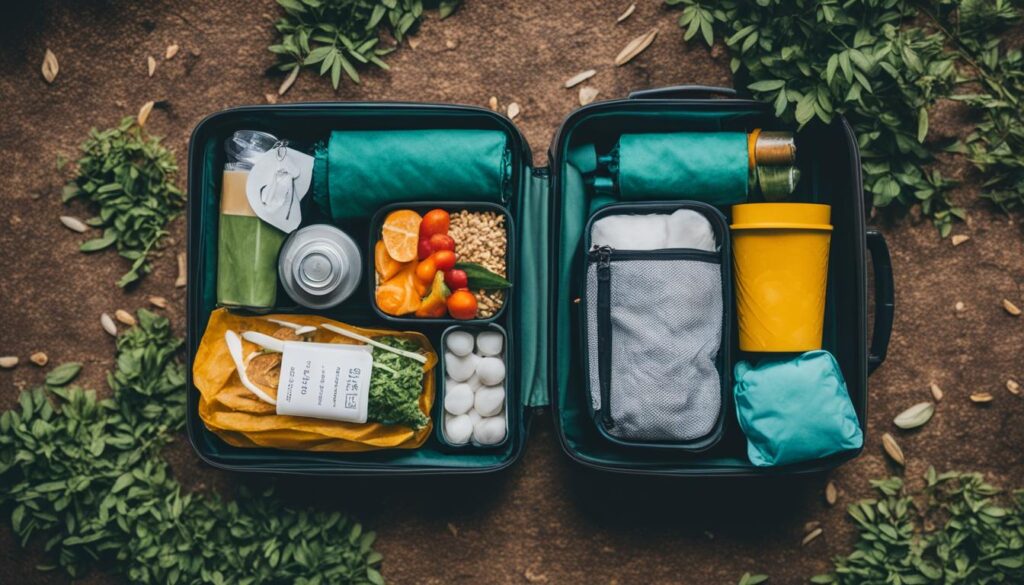Going on vacation is exciting, but it can also leave a significant environmental footprint. Have you ever wondered, How can I reduce my travel waste? If you’re seeking travel waste reduction tips, you’ve come to the right place. In this section, we present practical solutions to help you embrace waste-free traveling and adopt eco-friendly habits on your next trip.
The objective of this guide is simple: to minimize the waste generated during travel. We’ll dive into specific ways to pack light, refuse single-use plastics, reduce energy consumption, and more. Implementing these tips not only reduces your environmental impact but also makes your travels more sustainable.
Understand the Importance of Sustainable Travel Practices
Before you start planning your eco-friendly travel itinerary, it’s essential to understand why sustainable travel practices are crucial. By adopting eco-friendly travel habits, not only are you reducing your carbon footprint, but you are also contributing to the preservation of natural resources, supporting local economies, and reducing pollution levels.
Here are some eco-conscious travel tips to consider:
- Use public transportation, cycling or walking instead of private vehicles or air travel to reduce your carbon footprint.
- Choose eco-friendly accommodations that prioritize sustainable practices, such as eco-hotels, eco-lodges or homestays.
- Minimize single-use plastics and excessive packaging by shopping locally for items and carrying reusable alternatives.
- Practice responsible tourism by respecting local cultures, supporting local economies and engaging in activities that have a positive impact on communities.
- Reduce your energy and water consumption by turning off lights and reusing towels in accommodations, conserving water during outdoor activities and opting for local, seasonal and organic food and drink.
The Impact of Sustainable Travel Practices
Sustainable travel practices not only benefit the environment but also local communities. By supporting local economies, you contribute to the social and economic development of the region, making it more attractive for future tourists. Additionally, by reducing pollution and preserving natural resources, you are protecting the beauty of the destination for future generations to enjoy.
“In the end, we will conserve only what we love, we will love only what we understand, and we will understand only what we are taught.” – Baba Dioum
By embracing sustainable travel practices and adopting eco-friendly travel habits, you can make a positive difference in the world and have a meaningful impact.
Pack Light and Smart for Minimal Waste
When it comes to reducing your travel waste, packing light and smart is key. By bringing only the essentials and opting for eco-friendly products, you can significantly reduce the amount of waste generated during your travels. Here are some sustainable packing tips to help you pack smart:
- Choose reusable containers: Instead of bringing single-use plastic bags, opt for reusable containers made from silicone or stainless steel. These containers can be used to store snacks, leftovers, or toiletries, helping you avoid unnecessary waste.
- Use solid toiletries: Solid toiletries like shampoo bars, soap bars, and toothpaste tablets come with minimal packaging and do not count towards your liquids allowance on flights. Plus, they are lighter than their liquid counterparts and last longer, making them a great choice for eco-friendly travelers.
- Bring your own water bottle: Instead of buying bottled water, bring your own refillable water bottle and fill it up at water fountains or cafes. This way, you can stay hydrated without contributing to the plastic waste problem.
- Pack multi-purpose items: Opt for clothing items that can be worn more than once and serve multiple purposes. For example, a sarong can double as a beach towel, a scarf, and a dress, while a pair of convertible pants can be worn as shorts, pants, or capris.
- Avoid single-use items: Say no to single-use items like plastic cutlery, straws, and cups. Instead, bring your own reusable options or simply opt for eco-friendly establishments that offer them.
Remember, packing light not only helps reduce your waste footprint but also makes your travels easier and more enjoyable. By following these sustainable packing tips, you can make a positive impact on the environment and travel more responsibly.
Choose Eco-Friendly Accommodations
Your accommodations play a crucial role in reducing your travel waste. By choosing environmentally responsible lodging, you support businesses that prioritize sustainable initiatives and minimize your environmental impact. Eco-friendly accommodations such as eco-hotels, eco-lodges, and homestays are excellent options to consider for your next trip.
Eco-hotels are hotels that implement sustainable practices in their operations, from energy-efficient lighting and water-saving systems to using renewable energy sources and organic cleaning products. These hotels also promote eco-conscious travel tips, such as offering bike rentals or encouraging waste-free traveling.
Eco-lodges are another type of accommodation that focuses on environmentally responsible practices. They are often located in remote areas, allowing travelers to connect with nature, participate in sustainable activities, and learn about local cultures. Many eco-lodges are built using natural materials and follow permaculture principles, minimizing their environmental footprint.
Homestays are another eco-friendly option that supports local communities. By staying with a local family, you get to experience the local culture and support small businesses directly. Homestays minimize waste and promote responsible tourism practices, such as supporting locally sourced food and reducing energy and water consumption.
| Accommodation Type | Features |
|---|---|
| Eco-hotels |
|
| Eco-lodges |
|
| Homestays |
|
When selecting eco-friendly accommodations, make sure to do your research and verify their sustainability claims. Look for certifications, such as Green Globe or the Global Sustainable Tourism Council, which ensure that the lodging meets specific eco-friendly standards and has been audited by an external organization.
Embrace Sustainable Transportation Methods
Reducing your carbon footprint while traveling is an important step towards sustainable travel practices and reducing waste. By choosing sustainable transportation methods, you can significantly lessen your environmental impact. Here are some travel waste reduction tips to help you embrace eco-friendly transportation:
- Take public transportation: Using public transportation, such as buses, trains, and subways, are excellent ways to limit your carbon footprint while traveling. You can also explore the local area while getting to your destination.
- Cycle or walk: If you’re in an urban area or just need to travel a short distance, consider cycling or walking rather than taking a taxi or private vehicle. It’s a great way to sightsee, get exercise, and reduce your carbon footprint at the same time.
- Offset your carbon footprint: If you can’t avoid air travel, you can reduce your impact by offsetting your carbon footprint with various initiatives. For example, you can purchase carbon credits or donate to a conservation organization.
In addition to implementing these travel waste reduction tips, it’s important to choose eco-friendly transportation providers when possible. For example, some airlines have started using sustainable aviation fuel, which could reduce CO2 emissions by up to 80%.
“Sustainable transportation is essential to reducing our carbon footprint and preserving the environment for future generations.”
Minimize Single-Use Plastics and Packaging
When it comes to travel waste reduction tips, avoiding single-use plastics and excessive packaging is essential. These types of waste are incredibly harmful to the environment and can take hundreds of years to decompose.
Here are some travel waste reduction tips to minimize plastic waste on your trips:
- Refuse single-use plastics: Say no to plastic bags, utensils, cups, and straws. Instead, carry your reusable alternatives, such as a reusable water bottle, utensils, and straws.
- Shop locally: When purchasing souvenirs or gifts, support local businesses that use sustainable packaging and avoid excess plastic wrapping.
- Carry reusable bags: When shopping or packing, consider carrying a cloth or reusable bag to avoid plastic bags.
- Recycle: Make sure you dispose of your trash responsibly and recycle whenever possible. Familiarize yourself with the local recycling guidelines to ensure proper disposal.
By adopting these waste reduction strategies, you can significantly minimize your environmental footprint and contribute to waste-free traveling.
Practice Responsible Tourism and Respect Local Cultures
While reducing your travel waste is a critical component of eco-conscious travel, engaging in responsible tourism practices is equally essential. When you travel, you have the opportunity to support local communities and make a positive impact on the environment. By being a responsible traveler, you can help preserve cultural heritage and support local economies.
Here are some eco-conscious travel tips to practice responsible tourism:
- Learn about local customs and dress codes before your trip and respect them during your stay.
- Support local businesses and purchase locally produced souvenirs or products.
- Consider volunteering with organizations that support local communities and wildlife conservation.
- Be mindful of your impact on natural and cultural heritage sites. Avoid littering, stay on designated trails, and do not disturb wildlife.
Engaging in responsible tourism is not only better for the environment, but it also helps to ensure that local cultures and communities are preserved for future generations. By adopting eco-conscious travel habits and respecting local customs, you can make a positive impact on the world.
“Responsible tourism isn’t about sacrificing your travel experiences; it’s about enhancing them by making conscious choices that benefit both the environment and the local community.”
Engage in Sustainable Eating and Drinking
When traveling, your food and beverage choices can have a significant impact on the environment. To minimize your environmental footprint, consider adopting these eco-conscious travel tips:
Eat Local and Seasonal
Supporting local farmers and buying seasonal produce decreases the carbon footprint associated with food transport. By eating local, you also engage in responsible tourism practices and support the local economy. Try visiting farmer’s markets or asking for recommendations from locals.
Choose Organic
Organic products are grown without synthetic chemicals that pollute soil and waterways. By choosing organic food and drink options, you reduce the impact of harmful chemicals on the environment while also supporting sustainable agriculture.
Reduce Food Waste
Minimizing food waste is essential for eco-friendly travel. By choosing restaurants with sustainable practices or opting for smaller portions, you can reduce food waste. Additionally, carry a reusable container to save leftovers and avoid single-use packaging.
“Food waste is a major contributor to greenhouse gas emissions and our general environmental impact. I think we all have an opportunity to do better and thinking about it in our food choices, while on holiday, is just as important,” says Alexandra Chang, the Director of the Asia Pacific Economic Cooperation (APEC) Policy Support Unit.
Environmental Impact of Food Choices
| Food Choice | Environmental Impact |
|---|---|
| Local and Seasonal | Supports sustainable agriculture and reduces carbon footprint from transportation and storage. |
| Organic | Reduces exposure to harmful chemicals and supports sustainable farming. |
| Meat and Dairy | Consumption of meat and dairy products is associated with high greenhouse gas emissions and inefficient resource use. |
| Processed Foods | Use more energy and water during production and transportation, resulting in higher carbon emissions. |
Shop Responsibly
Supporting establishments that follow sustainable practices is crucial for responsible tourism. Opt for eco-friendly restaurants that implement strategies such as composting, recycling, and reducing single-use plastics. By choosing conscious businesses, you contribute to local sustainability efforts.
Incorporating sustainable eating and drinking practices into your travels is an essential aspect of minimizing environmental impact during travel. By making conscious choices in your food and beverage consumption, you can travel more responsibly and support sustainable living practices globally.
Reduce Your Energy and Water Consumption.
Reducing your energy and water consumption while traveling is an effective way to minimize your environmental impact. Follow these simple tips to help you keep your energy and water use to a minimum:
- Turn off lights and air conditioning when leaving your accommodations.
- Unplug chargers and electronics when not in use to avoid phantom power consumption.
- Reuse towels and linens in your accommodations instead of requesting new ones daily.
- Take shorter showers and turn off the water while brushing your teeth.
- If camping or hiking, use biodegradable soap to clean yourself and your dishes.
By following these strategies, you can reduce your environmental footprint and enjoy a more eco-conscious travel experience.
Conclusion
Reducing your travel waste and adopting eco-friendly habits is an important step towards creating a more sustainable future for travel. By implementing the waste reduction strategies we’ve discussed, you can minimize your environmental impact and make your trips more eco-friendly. Remember to be conscious of your choices, pack light and smart, choose eco-friendly accommodations, embrace sustainable transportation options, minimize single-use plastics, practice responsible tourism, engage in sustainable eating and drinking, and reduce your energy and water consumption.
Additionally, consider exploring various eco-travel initiatives that align with your values, such as supporting conservation efforts or volunteering with local communities. Together, we can work towards waste-free traveling and create a positive impact on the planet and its people.

















































